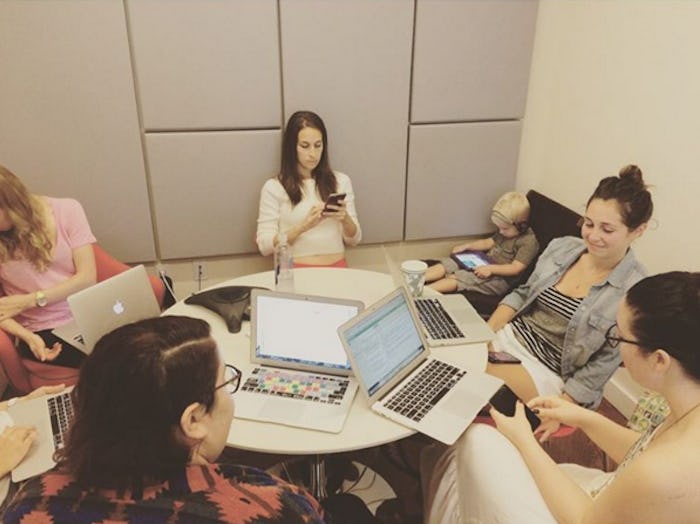Life

The One Thing You Need To Know If You're Worried What Having A Baby Will Do To Your Career
The pitiful state of family leave policies in the U.S. would have any working mom worried. Without guaranteed paid leave and, for companies with fewer than 50 employees, zero workplace accommodations required for nursing mothers, trying to maintain your career momentum once you have a kid is a considerable drain on financial, emotional and basic human resources. With barely any available subsidized childcare for working families, so many women opt out of their career because the economics don’t make sense when you’re working 40+ hours a week and most of that pay goes to someone to watch your child (not to mention that childcare workers are shockingly underpaid).
When I took maternity leave after the birth of my first baby, I didn’t realize it was never again going to be business as usual. I thought I could compartmentalize work and life, dedicating as much time as always to my job in TV production, and then simply giving up a few of the hours I spent socializing and working out in the evening to accommodate taking care of my baby. I mean, that’s what “working mother” life looked like from the outside. But once I was in it, the distinction between work and life was never clear.
I’m at work, and daycare calls: She’s bumped her head (but she’s OK); I’m nursing her before bed, and responding to emails on my phone; I jostle for office refrigerator real estate for my pumped milk; I squeeze in self-maintenance appointments during lunch hours because I feel too guilty missing any more time away from my kid just to get a haircut; I take red-eyes on business trips to minimize time spent away from my daughter during her waking hours; I bond with the other working moms at the office as we exchange droopy-eyed nods in the hallways.
I returned to my job 12 weeks after giving birth to my second child, on the dot. With two children, I doubled down on trying to have control — two nap schedules, two feeding schedules, two sets of daycare teachers — all while working full-time. I kept lists and notes and reminders and alarms. I had a work phone and a personal phone, plus office and apartment landlines. One person, two email addresses, four phone numbers. I thought all of this made me bulletproof as a mother and an employee; I could be reached by work at home, and at work my children’s caregivers could always find me. I was available, to everyone, 24/7 and isn’t that the pinnacle of what it means to be a working parent? Isn’t that having it all?
No, because when working parents make everything a priority, everybody loses.
Being a mom taught me the most valuable career lesson: to ruthlessly prioritize.
I can’t be all things to all people. So I have learned to assess the complicated world we live in, where work and life are enmeshed, and pay attention to those things that matter in the moment. There will be other moments, where other things will matter. It shifts, constantly.
The truth is, there is no work-life balance. That revelation is a relief.
We can stop trying to keep even footing in both our personal and professional spheres; we can favor one over the other at times. I can’t go on all my kids’ school trips, but I go on at least one a year for each of them. I opted for a position with more creative work that I love, than one that provided a higher salary and title, because I’d rather show my kids what I made, than how I managed others to make it. I don’t apologize to my kids for going to work, because my career fulfills a part of me they never can. And I never apologize for leaving early for parent-teacher conferences, though I do put coverage in place when I need to be out of the office.
The one thing you need to know if you’re worried what having a baby will do to your career, is that it will make you even better at your job.
No, seriously. Hear me out.
My prioritizing skills have improved, now that I have little humans who want, and deserve, my attention. I put time limits on how long I spend on tasks. Breastfeeding taught me that (anything longer than 45 minutes was going to be futile anyway). Likewise, keeping my sentences short, maintaining eye contact and speaking calmly (you know, like how you talk to a child) are parenting skills that have helped my workplace communication.
Typical work culture still reflects the outdated model of a male employee having a stay-at-home partner to tend to the needs and schedules of the kids they both made. One parent represented “work,” the other, “life.” But that world doesn’t exist any more. More moms — and dads — than ever are toggling between those two arenas. The more we are upfront about this to our bosses, the better the chances we have of changing work culture. The more our employers see how efficiently parents are at their jobs, so that we can have lives outside of them, the more they will help to build a fluid work environment. Everyone wins.
If you're worried about what having a kid will do to your career, the best thing you can do for yourself is work on expanding your idea of what a working life looks like. Don’t be afraid that a kid will slow your career down — but also don't be married to the idea of any part of your life looking a certain way. Motherhood is an asset, not a detriment, to professional life. More companies are recognizing that, thanks to working parents like us.
Images: blanketboat/Instagram; Courtesy of Liza Wyles(2)